#Roman rulers
Text
I love having a bath with bubbles, it makes me feel like one of those ladies in a film covering my modesty from the bust of Octavian that watches over me
0 notes
Text
Roman rulers

He was a son of Livia Drusilla and a step-son of Augustus after he married Drusilla. Tiberius Claudius Nero, who was later given the name Tiberius Julius Caesar as Augustus adopted him as a candidate of his heir, was the second emperor to ever rule Rome after the death of Julius Caesar. Tiberius (16 November 42 BC – 16 March 37 AD) Tiberius (16 November 42 BC – 16 March 37 AD) Augustus ( September 63 BC – 19 August 14 AD)ġ0.Trajan (September 53 AD – 8 August 117 AD).Marcus Aurelius (April 121 AD – 17 March 180 AD).Claudius (August 10 BC – 13 October 54 AD).Hadrian (January, 76 AD – 10 July, 138 AD).Vespasian (November, 9 AD – 23 June 79 AD).Antoninus Pius (19 September, 86 AD – 7 March, 161 AD).Justinian (482 AD – 14 November 565 AD).Tiberius (16 November 42 BC – 16 March 37 AD).The 10 Major Aspects of Roman Religious Practice.Top 12 Must-Know Facts about Hannibal Barca.Top Inventions of Ancient Egyptian civilization.Top Ancient Civilizations That Ever Existed.Most Famous Roman Names and Their Roles in the History.Ancient Greeks Figures and Their Contributions.Most Influential Hindu Goddesses in India.Fabulous Ancient Chinese Inventions that Make Our Society Today.Top Inventions and Discoveries of Mesopotamia.Top Categories of Ancient Roman Foods and Drinks.Top 10 Significant Historical Events of Ancient Rome.Top Sumerian Inventions that is followed by other civilizations.Top 10 Most Influential Historical Events.Top Inventions and Discoveries of Ancient Greece.Most Revered Roman Goddesses : Names and Powers.Top Inventions of Persian Civilizations.Ancient Roman Inventions We Still Use Today.Prominent Chinese Gods and Goddesses from Mythology.

0 notes
Text
Roman rulers

We discuss the interpretation and possible reasons for this uncanny result, and we propose a number of fruitful venues for future work to help better understand the deeper etiology of the spectacle of regicide of Roman emperors. Results also showed that the stochastic process underlying the violent deaths of emperors is remarkably well captured by a (mixture) Weibull distribution. Nonparametric and parametric results show that: (i) emperors faced a significantly high risk of violent death in the first year of their rule, which is reminiscent of infant mortality in reliability engineering (ii) their risk of violent death further increased after 12 years, which is reminiscent of wear-out period in reliability engineering (iii) their failure rate displayed a bathtub-like curve, similar to that of a host of mechanical engineering items and electronic components. We investigate the temporal signature of this seemingly haphazardous stochastic process that is the violent death of a Roman emperor, and we examine whether there is some structure underlying the randomness in this process or not. This work adopts the statistical tools of survival data analysis to an unlikely population, Roman emperors, and it examines a particular event in their rule, not unlike the focus of reliability engineering, but instead of their time-to-failure, their time-to-violent-death. What is not known, however, and has never been examined is the time-to-violent-death of Roman emperors. This has been known for a while, if not quantitatively at least qualitatively. Of the 69 rulers of the unified Roman Empire, from Augustus ( d. One missing attribute in this list is, surprisingly, that this mighty office was most dangerous for its holder. Popular culture associates the lives of Roman emperors with luxury, cruelty, and debauchery, sometimes rightfully so.

0 notes
Text









“Marmoream relinquo, quam latericiam accepi”
— Augustus, First Roman Emperor
#ancient rome#augustus#classics#roman empire#roman emperor#emperor#roman#rome#italy#roma#gaius octavius#aesthetic#academia#latin#quote#ruler#city#daily#literature#classic academia#classic literature#academia aesthetic#books#moodboard#architecture#roman architecture#ancient roman art
159 notes
·
View notes
Text
Unrelated (really, unrelated), but it's interesting that there is a conception that the Greek Gods (as in the Olympians and such) are considered the heritage of our current Western culture, when they never remained as static and "canonical" as most Greek mythology fans seem to believe. During the Hellenistic period, as Greek culture spread through Alexander's conquests and Greek colonizations the gods and their importance varied. It's really interesting that as big empires with multicultural populations (Hellenistic Egypt, the Romans) arose, there also arose "universal" gods, like Serapis and the spread of Hellenic philosophy. And then with the Romans who weren't exactly Hellenistic, but they continued these dynamics with the Interpretatio Graeca, mystery cults, the interaction with Zoroastrian beliefs. And of course, the rise of Christianity at the end of this period.
And I'm not saying this in the "the Romans were tolerant" sense, but as how religion evolved and adapted as empires spread.
Of course, I'm mostly talking in a religious sense here, as in people actually worshipping the gods. In the sense that they are "myths" and fables, that could be another way of looking at them, but that mostly, I think, dates from the interest on Grecorroman culture from the Renaissance onwards. The Middle Ages weren't as influenced by Hellenism.
#cosas mias#some real interesting parallels there with the 'evolution' of Yaweh from the national god of the Israelites but one of many#to the universal one God of later Abrahamic religions#but it's never as simple as that just pointing out a comparison#I'm also conflating the Hellenistic period and the later Romans but they really had a lot of similarities religiously speaking#as in previously small *cultures* found themselves as rulers of massive empires
78 notes
·
View notes
Text
She’d attempted correspondence with the Hierarch to probe intentions and six months past the man had finally deigned to reply. Cordelia almost wished he hadn’t. The missive had been three pages long, most of which castigating the notion of inherited rule as Wicked Tyranny, Procer itself as A Rapacious Pack Of Foreign Oligarchs and her suggestion of formal truce talks as Treason Against The Will Of The People. Which people in particular, she’d noted, he had not specified. He’d at least recognized her title of First Prince, as it was the result of an election.
Unrated Anaxares moment. It's just immensely funny to imagine him getting ready to write a letter denouncing Cordelia as a tyrant but deciding to use her proper title because she was in fact elected to that specific position
#pgte#for non-PGTE readers think the Holy Roman Empire with the ruler elected by/from a group of princes/princesses#but the position/title hasn't been captured by one family
13 notes
·
View notes
Text
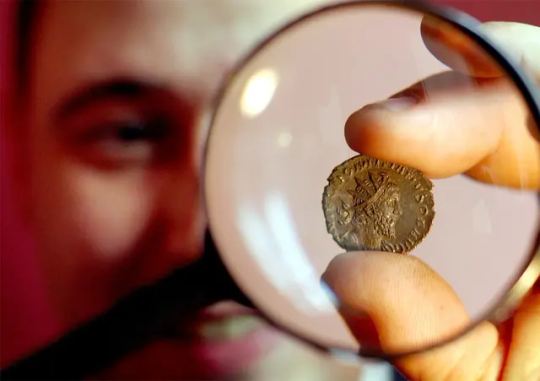
Coin reveals little-known Roman ruler
Treasure hunters have unearthed a coin bearing the head of a virtually unknown Roman ruler who briefly held power in Gaul around A.D. 270 as the empire teetered.
It is only the second coin ever found showing the head of Domitianus, who seized power — and the mint — in the breakaway Gallic Empire, which included modern England, France and parts of Germany and lasted for 15 turbulent years.
“We know next to nothing about Domitianus, except that he was ‘punished’ by the Roman Emperor Aurelian for treason,” Richard Abdy, curator of Roman coins at the British Museum, told Reuters. “But at least now we know what he looked like.”
Studied by coin experts
The first coin bearing Domitianus’ head was found in the Loire area of France in 1900, dismissed as a fake because his name was unknown and then lost from sight in a small museum in Nantes until very recently.
“It is now being studied by numismatists. When I showed our coin to the woman who has been working on it she jumped for joy because it bore out everything she had said about hers,” Abdy said, noting the French coin had been dated to A.D. 271.
The Gallic Empire was established in 260, when rule from Rome was weakening, by Postumus. He was succeeded nine years later by Marius, who held the throne for a matter of weeks before being strangled and in turn replaced by Victorinus, who ruled until 271 when he too was murdered.
Domitianus is believed to have murdered Victorinus, who had a habit of raping the wives of his subordinates, before himself being ousted by Tetricus. Tetricus ruled from 271 to 274, when he was defeated by Aurelian and the empire was restored.
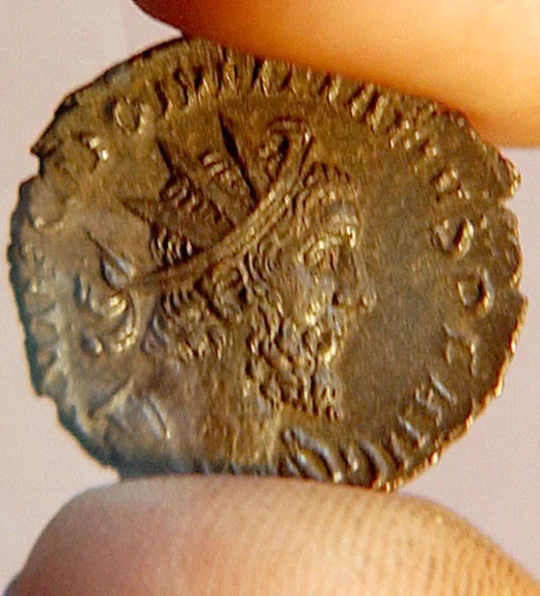
Found on farmland
The British coin, which goes on show at the British Museum starting Wednesday, was found on farmland near Oxford just under a year ago as part of a hoard of 5,000 Roman coins fused together in an earthenware pot.
“It is a type of coin we know as a ‘radiant’ because there are rays radiating from his head. It is a two-denarii piece, which at that time, when they were coining money as fast as they could, would have been worth a couple of hours’ work,” Abdy said.
The base metal coin, which originally had a surface coating of silver, is now conservatively estimated to be worth a five-figure sum, Abdy said.
At the time it was minted, the once-mighty Roman Empire was undergoing a period of intense flux.
The years between 270 and 285 were marked by chaos in the empire, with more than 20 different emperors and 30 different pretenders fighting for power. Only one of these leaders died a natural death.
By Jeremy Lovell.
Original posted Feb. 24, 2004.
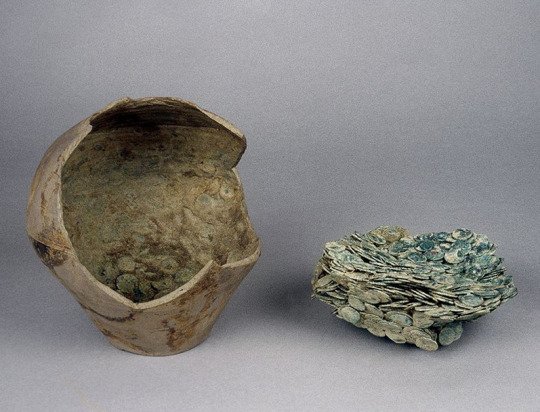

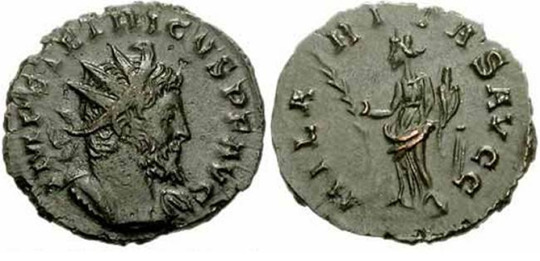
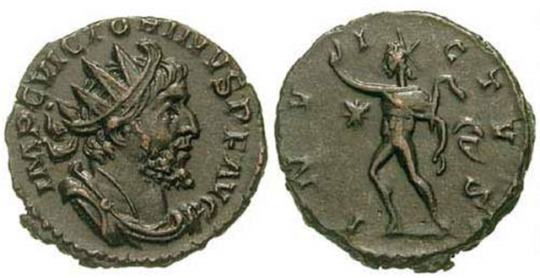
The Coin Hoard
Until this discovery was made some scholars doubted the historical significance of Domitianus who is named just twice in the historical sources. The Oxfordshire coin provides archaeological evidence suggesting that he successfully proclaimed himself emperor of a breakaway part of the Roman Empire during the reign of Aurelian (AD 270-5).
Richard Abdy (Curator of Roman coins at the British Museum) said that ‘during the 270s AD the fabric of the Roman Empire had become strained. Breakaway empires, like the so-called ‘Gallic Empire’ that included Britain, were established and ruled by a succession of rebel emperors. Finding a coin produced in the name of Domitianus means that he should now be recognised as one such rebel emperor.’
The failure of Roman writers to identify him as a rebel emperor even led the only other coin of Domitianus – found in France in 1900 – to be dismissed as a modern fake. The new discovery was struck from the same dies that were used to produce this earlier find and has therefore put its authenticity beyond any doubt.
Ian Leins (Finds Adviser, Iron Age and Roman coins, Portable Antiquities Scheme) said ‘the portrait on the new coin very closely resembles that of the rebel emperors Victorinus and Tetricus. It is highly possible that other coins of Domitianus exist in the collections of museums and individuals but have escaped detection. It is important that people start to pay more attention to these often neglected finds and record them with their local Finds Liaison Officer.’
#Coin reveals little-known Roman ruler#coins#collectable coins#roman coins#rebel emperor#Domitianus#Gaul#Gallic Empire#Aurelian#ancient artifacts#archeology#archeolgst#history#history news#ancient history#ancient culture#ancient civilizations#roman history#roman empire#roman emperor
62 notes
·
View notes
Text

Another GlassHeart painting to share with y’all, I like this one a lot better than the last and I hope y’all like it too 💜
(Last initial crossed out for privacy reasons)
(Edit: Chloe was looking a bit blurry there so I re-uploaded a better picture of it)
#glassheart#ahhh i love these cuties so much!!#this scene is my roman empire#i alligned their eyes with a ruler to make sure they’re pricisely looking one another in the eye#this took me 15-20 hours you guys this hobby is killing me#this is the smallest painting I did and it made it so much more harder#redcharming#charminghearts#glassrose#red x chloe#chloe x red#chloe charming x red of hearts#chloe charming x red#chloe charming#red of hearts#red of wonderland#princess red#rise of red#descendants rise of red#glassheart fanart#acrylic painting
9 notes
·
View notes
Text
one of my what-ifs in history is wondering how western mediterranean history and relations with the east would have changed had arian christianity triumphed over nicean christianity and how this would have affected the development and national identities of early medieval western kingdoms
#like the reason so many arian rulers chose to embrace nicean christianity was to integrate better with local roman populations#but what if they..... didnt. what if christianisation of rural spaces had been achieved by arian clergy instead of nicean#what if it took much longer for migrant and native populations to intermingle as a result.#how would this affect relations with constantinople? attraction to islam?#eli talks
7 notes
·
View notes
Text
In my experience and education(which is not complete by any means) Emperor/Empress tends to be the highest title for royalty in the English language and is almost always used when there is a connection to the Roman Empire OR used as a term to translate titles in foreign cultures for English speakers to understand (the Japanese for instance do not call their ruler an Emperor), with King/Queen following that, then followed by Duke/Duchess, then Count/Countess and then Baron/Baroness
Lord as far as I understand it has been used mainly as a catch all be all for anyone below the rank of a King.
#ooc#the term emperor is a strange one ngl#its the evolved form of 'imperator' that gradually became the title of Roman rulers
11 notes
·
View notes
Text
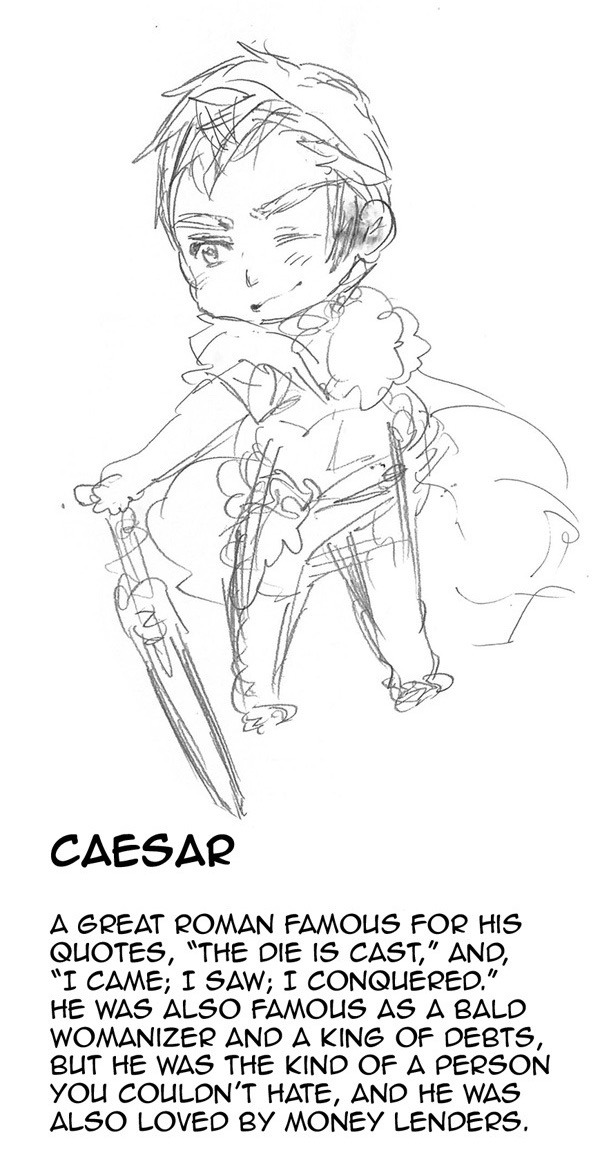
go caesar it’s ur death day
#we gon party like it’s ur death day#i forgot that hima drew ancient roman rulers in hetalia#if you saw my previous post no you didn’t#anyways#all jokes#aph caesar#aph italy#aph ancient rome#hetalia#world stars hetalia#hws italy
13 notes
·
View notes
Text

50 notes
·
View notes
Text

BELUS Jupiter, when his father Nimrod had ruled for 56 years, the son himself reigned, in the 1844th year of the world and the 2118th year before the birth of Christ. He built up the marked-out foundations of Babylon, more like a fortress than a city. He enjoyed constant peace around the borders of his empire. Consult Berossus book 5, as above.
#belus#jupiter#babylonian myth#roman myth#prima pars#mythical figures#rulers#euhemerism#berossus#pseudo berossus#annius of viterbo
8 notes
·
View notes
Note
yes explain please :DD
OKAY!! this could totally be the most uninteresting thing so if it is, i apologise in advance <3 sorry for reading this whole thing and hyping up a potentially, totally boring fact.
ANYWAYS, so kaiser's etymology for his last name means 'emperor' or 'ruler', which is cool and germanic and all that, but if you trace the origins of 'kaiser' or 'kaesar' back to history, we end up at the most notable and most famous figure of all of ancient history; julius caesar.
caesar, in latin, is actually pronounced like 'kai-ser', in comparison to how we've adopted a 'see-sur' way of saying his name in english. during his time as consul/most powerful figure in rome. i don't want to explain everything that caesar has done to make him as powerful as he was, but just know that he's very very very awarded in realms of military conquests, politics, writing, giving speeches, and he's very well-liked by the poor people of rome.
so accomplished that he was a threat to the stability of the senate, so when he was assassinated, all chaos fell upon rome because 'oh my god... what do we do with the man who basically guided us and repaired rome after such a long time of civil wars?'.
from caesar's death actually birthed the first emperor of rome, so now we have transitioned into the roman empire! the whole first line of roman emperors kept the name 'caesar' because 'caesar' remained synonymous with 'power' or 'emperor'. in fact, augustus (first emperor) deliberately changed his name and referred to himself as 'caesar' so people could respect his power and legitimacy. fast forward a little, many historical figures like napoleon or mussolini drew inspiration from caesar himself because of just how powerful he is.
actually, over the scope of history, 'caesar' (or 'kaiser') eventually became a generic way of saying for 'emperor', and we see that meaning resonate with michael kaiser too- who is the 'emperor' of the field, so. yeah! basically, the history of kaiser's last name leads to the cool history of caesar and is a little, fun easter egg that i think is quite neat. but i am also just a huge nerd for things like this. 'emperor' of the field is fun.
idk what you can do with this information, maybe you can imagine kaiser in roman getup or whatever but historically, he'd be quite displeased at that because the german celts were actually colonised by caesar so. that's fun.
anyways, thanks for enabling my ranting and shitposting of my knowledge :3 i love roman history because of how dramatic it is. i feel like i'm sitting in the senate with how juicy the events are. hope u enjoyed whatever i just posted.
#caesar wasn't a cruel ruler#one of his main personality traits was that he was too kind#or maybe that was just towards the romans#he's too trusting that's why he got assassinated#so idk what happened to MICHAEL over here but yk#earfsmercury#bakerysnake#earf's inbox hours ✌️
42 notes
·
View notes
Text
I don't trust things not being on the inspo board when Rosemary's Baby and Oedipus The King are straight up just not there despite the clear references
#they will literally Lie when it comes to anything about the wheelers. i respect that tho.#how many times do they have to bring up spawns of satan and satans baby before people go wait. rosemarys baby#esp the various uses of roses symbolistically similar to RB#honestly id even argue the grandfather clock qas also ripped from rosemarys baby esp since its mostly associated with roman#who is the head of the cult and the mastermind who preyed on rosemary to begin with#'satan' being a stand in for the men in rosemarys life inc guy and roman#and dont get me started on oedipus... like the eyes? being gouged out? victor? vecna victims?#thebes being struck by a plague until the 'source' is found? literally s2 and s3? el trying to find the source#alexei saying that opening a portal only works in hawkins bc there is something special about hawkins? what was causing the downfall#of thebes was Oedipus the entire time? bc he was the 'source'? and for thebes not to be cursed anymore oedipus needs to be either cursed or#exiled?#*killed or exiled#the karen look alike on front of the missing persons board? oedipus goes missing after realizing the truth? kill me now#st x rosemarys baby#st x oedipus the king#and like. dont even get me started on edward henry and richard all meaning some variation of 'king' or 'ruler'
10 notes
·
View notes
Note
Ok what’s ‘*weird Al intensifies*’ about that sounds bonkers
I feel like i have to forewarn you that weird al makes no appearances whatsoever in this WIP. This is a short and surprisingly emotional AU where various members of the Ghost crew get thrown back in time and basically adopt their past selves while pretending to be long lost family members.
"wait jess, why is it called weird al intensifies-" cause there's a lyric that goes "there's always two of me just a-hangin' around" in weird al's 'i think i'm a clone now', which i had stuck in my head at the time i was writing this fic, and there IS two of everyone in this AU, and it was 2AM, and I didn't have a better title. that's why.
heheh um annnnyway, snippet?
---
Sabine woke up feeling warm, dry, and not in pain, so the only logical conclusion to draw was that she was dead.
“You’re not dead, kid.”
She opened her eyes with a short gasp and tried to sit up, but a gentle hand caught her shoulder and pushed her back down.
Sabine looked up.
There was a Mandalorian woman standing over her, in brightly painted armor that reminded Sabine of her own.
They were in some kind of ship; Sabine was lying on a bunk. Her mud-spattered armor had been stripped off and set aside, and she could feel bandages wrapped around her stomach.
“Who are you?”
The woman stared at her for a second, and then turned away. “You can call me Tatia.”
“Are you a bounty hunter?”
Tatia shook her head, stepping across the room to some shelves and collecting a few items. “I tried that, once. Didn’t work out.”
“I’m a bounty hunter,” Sabine said, slowly raising herself to sit, propped against the back of the bunk.
“I suspected that.” Tatia came back. “Did the bounty shoot you, or did your buddies decide there would be more profits to go around without you there?”
Sabine tried not to flinch, but Tatia must have seen. She sat down carefully on the edge of the bunk, setting aside the supplies with a sigh.
“I get it, kid. Betrayal sucks. There was a time when everyone I knew and trusted turned their backs on me. I had no one left. Felt like I hit rock bottom.”
“I don’t have anyone left, either,” Sabine said, and was about to add that she didn’t need anyone when Tatia spoke up.
“That’s not quite true,” she said, and then she reached up and took off her helmet, and Sabine gaped in astonishment as a face just like hers smiled back at her.
Tatia’s eyes sparkled. “You’ve got me, little cousin.”
#thank you for the ask!!#and apologies for the disappointing lack of weird al in this au XD#the two of me AU#(working title)#sabine wren#fic snippet#fun fact in this AU everyone has significant names#for example#'Tatia' was the name of the daughter of the historical-ish figure Titus Tatius#and according to roman myth(?) Titus Tatius was the co-ruler of Rome but more importantly he was the king of the Sabines#(the historical people who Sabine is named after!)#i did so much research for the names in this AU you wouldn't even believe--
11 notes
·
View notes